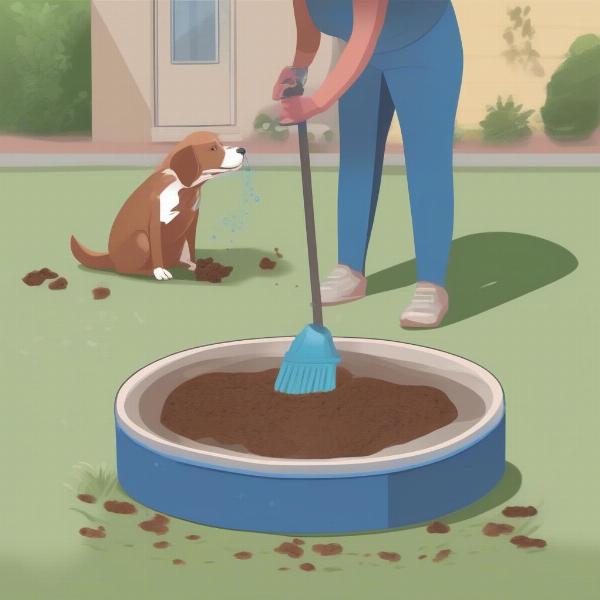Deworming a pregnant dog is a topic that raises many questions for expectant pet parents. It’s natural to be concerned about the health of both the mother and her developing puppies. This article will address the important considerations and best practices regarding deworming during pregnancy to ensure the well-being of your furry family.
Is Deworming a Pregnant Dog Safe?
The safety of deworming a pregnant dog depends on several factors, including the specific dewormer used and the stage of pregnancy. Some dewormers are safe to use during pregnancy, while others are not. It is crucial to consult with your veterinarian before administering any medication to your pregnant dog. They can assess your dog’s individual needs and recommend the safest and most effective deworming protocol. Never self-medicate your pregnant dog as this could have serious consequences for both the mother and the puppies.
Why is Deworming Important During Pregnancy?
Intestinal parasites can negatively impact a pregnant dog’s health and can be transmitted to her puppies. Worms compete for nutrients, leading to malnutrition in the mother and potentially affecting fetal development. Some parasites can also be passed to the puppies through the placenta or milk, leading to health problems in the newborns. Therefore, preventing and treating worm infestations is a vital part of prenatal care for dogs.
Which Dewormers are Safe for Pregnant Dogs?
As mentioned earlier, not all dewormers are safe for pregnant dogs. Some dewormers, like fenbendazole, are generally considered safe to use during pregnancy, particularly in the later stages. However, even these should only be administered under the guidance of a veterinarian. Other dewormers, such as ivermectin, can be harmful to developing puppies and should be avoided. Your veterinarian will be able to recommend a safe and effective dewormer based on your dog’s specific circumstances.
When Should You Deworm a Pregnant Dog?
The timing of deworming during pregnancy is also crucial. Your veterinarian may recommend deworming in the later stages of pregnancy to minimize the risk of parasite transmission to the puppies. They may also suggest deworming the puppies shortly after birth and then regularly throughout their early development. A tailored deworming schedule is essential for ensuring the health of both the mother and her offspring.
What are the Signs of Worms in a Pregnant Dog?
Even with preventative measures, it’s important to be vigilant for signs of worms in your pregnant dog. These can include:
- Vomiting
- Diarrhea
- Weight loss
- Pot-bellied appearance
- Lethargy
- Changes in appetite
If you notice any of these signs, contact your veterinarian immediately.
Can I Prevent Worms in My Pregnant Dog?
Maintaining good hygiene practices can help prevent worm infestations. This includes regularly cleaning your dog’s living area, picking up feces immediately, and preventing your dog from scavenging or eating contaminated food or water. Regular veterinary check-ups are also essential for early detection and treatment of parasites.
 Hygienic practices for preventing worms in pregnant dogs
Hygienic practices for preventing worms in pregnant dogs
Conclusion
Deworming a pregnant dog can be a complex issue, and it’s vital to work closely with your veterinarian to ensure the safety and well-being of both the mother and her puppies. By following their recommendations and maintaining good hygiene practices, you can minimize the risk of parasite infestations and help your dog have a healthy pregnancy and litter.
FAQ
- When should I deworm my pregnant dog? Always consult your vet. They may recommend deworming in the later stages of pregnancy.
- What dewormers are safe for pregnant dogs? Fenbendazole is generally considered safe, but always consult your vet.
- What are the signs of worms in a pregnant dog? Vomiting, diarrhea, weight loss, pot-bellied appearance, lethargy, and changes in appetite.
- Can I prevent worms in my pregnant dog? Yes, maintain good hygiene and regular vet check-ups.
- Is it essential to deworm a pregnant dog? It is crucial for the health of the mother and puppies. Consult your veterinarian.
- What are the risks of not deworming a pregnant dog? Malnutrition in the mother, transmission of parasites to puppies, and potential developmental issues.
- How often should I deworm my dog after she gives birth? Your vet will recommend a suitable deworming schedule for the puppies.
ILM Dog is your trusted resource for expert advice on all aspects of dog care, including breed selection, health, training, nutrition, grooming, and much more. Whether you’re a new dog owner or a seasoned pro, we provide practical, reliable information to help you navigate the joys and challenges of dog ownership. For personalized guidance tailored to your dog’s specific needs, contact our team of experts at [email protected] or call us at +44 20-3965-8624. Visit ILM Dog today for all your dog care needs.